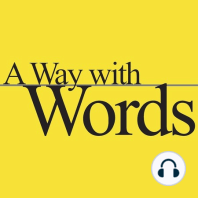9 min listen

Language Headlines - 11 August 2008
FromA Way with Words - language, linguistics, and callers from all over
Language Headlines - 11 August 2008
FromA Way with Words - language, linguistics, and callers from all over
ratings:
Length:
4 minutes
Released:
Aug 11, 2008
Format:
Podcast episode
Description
Grant dishes up the latest language headlines from around the world.Oh, what a difference a letter can make! The Moscow Times reports this week that Tatyana Tetyorkina was stripped of her Russian citizenship because a government clerk's typewriter was missing a single letter. Instead, a different vowel was used, making her Teterkina rather than Tetyorkina--and making who she said she was and who her papers said she was disagree. Public outcry over the matter has since caused her citizenship to be reinstated, but Tatyana is still pursuing it in the Russian courts.In Slate magazine, Eugene Volokh takes a look at names that are so weird that they were brought before the courts. There's the nine-year-old New Zealand girl named Talula Does the Hula From Hawaii. Yes, that's the entire name. There's someone named They T-H-E-Y, there's Darren Lloyd Bean, spelled Darren Q-X Bean, and more Santa Clauses than a Santa Claus convention.Caroline Winter fills in for William Safire in the New York Times Magazine, where she discusses why we capitalize the pronoun 'I.' She says, in short, that a lowercase I is hard to see on the page, but an uppercase I is a cinch to read. She suggests, just for a little self-humbling, that we capitalize you, Y-O-U, instead.Also in the New York Times, Nicholson Baker gives a favorable review to Ammon Shea's book, Reading the OED, in which he spent an entire year reading the print version of the second edition of the Oxford English Dictionary. Baker calls the book 'oddly inspiring' and says, 'The effect of this book on me was to make me like Ammon Shea and, briefly, to hate English.'Finally, dictionary editor Erin McKean asks in the Boston Globe why people use a word and then sheepishly wonder if it is really a word. She writes, 'Whenever I see 'not a real word' used to stigmatize what is (usually) a perfectly cromulent word, I wonder why the writer felt the need to hang a big sign reading 'I am not confident about my writing' on it. What do they imagine the penalty is for using an 'unreal' word? A ticket from the Dictionary Police?' Cromulent, by the way, is a made-up word from The Simpsons. It means good or fine.Okay, fine. That's all for this week's language headlines. You can find links to all of these stories on the discussion forum of A Way with Words, public radio's weekly call-in show about language. Find it at waywordradio.org.--Get your language question answered on the air! Call or write 24 hours a day: (877) WAY-WORD/(877) 929-9673, words@waywordradio.org, or visit our web site and discussion forums at http://waywordradio.org. Copyright 2008, Wayword LLC.
Released:
Aug 11, 2008
Format:
Podcast episode
Titles in the series (100)
This Week or Next? (minicast) by A Way with Words - language, linguistics, and callers from all over